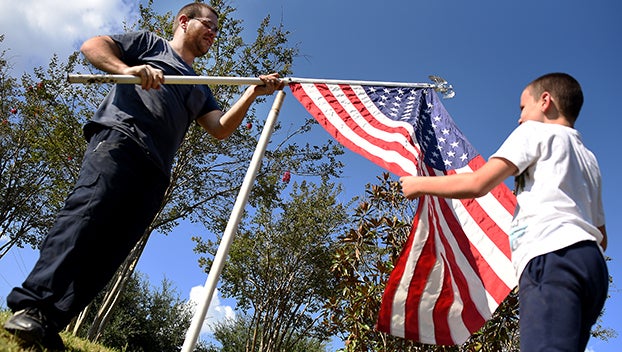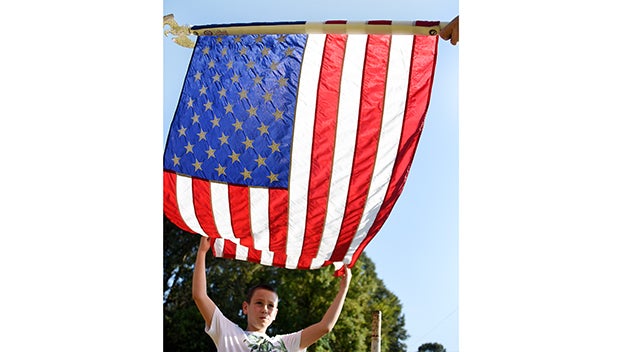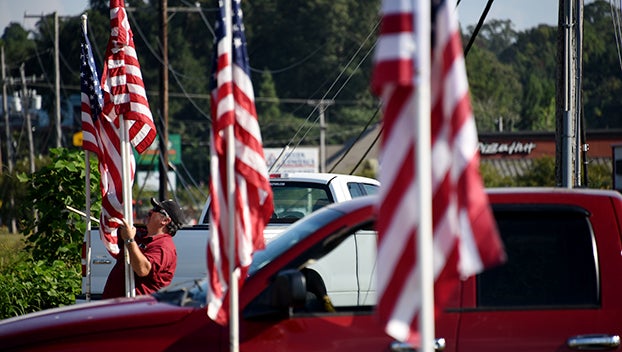Never Forget: Three local stories from 9/11 eighteen years later
Published 12:18 am Wednesday, September 11, 2019
By Scott Hawkins and Ben Hillyer
Eighteen years ago, four hijacked planes were used in a coordinated attack on the United States, killing more than 3,000 people in New York City, Washington, D.C., and Shanksville, Pennsylvania.
The memories of Sept. 11, 2001, and the days following still linger for three local residents, who experienced the tragedy from three unique perspectives.
World Trade Center Towers
Doug Mauro said he not only remembers the events of Sept. 11, 2001, but he also remembers the aftermath of that day.
Mauro, who since 2004 has been a co-owner of Oak Hill Inn, a bed & breakfast in Natchez, lived in Asbury Park, New Jersey, at the time of the attacks.
“From where I grew up you could see the towers across the bay on a clear day,” Mauro said. “We saw the second plane hit live.”
At the time Mauro worked for LabCorp, a leading medical diagnostic company in the United States.
“After 9/11, they started finding body parts on roofs and everything, and we did free DNA testing with the families of the loved ones that they lost,” Mauro said. “I was like a liaison. I would greet these family members. They would bring me their loved ones’ toothbrushes and hairbrushes, and we would do a free DNA match when they found body parts.”
Mauro said that process went on for approximately two years after Sept. 11, 2001.
“People who didn’t live in that area didn’t realize the impact, because this went on for years,” Mauro said. “The obituaries were really big each day, and they would find a body part and they would have another obituary and another memorial.”
Also, Mauro recalled that even in New Jersey, across the Bay from New York City, people could smell the smoldering rubble of the World Trade Center Twin Towers that fell that day after terrorists flew hijacked airplanes into the buildings.
“Where we lived … along the shore, we could smell … those buildings that came down and burned for like six months,” Mauro said. “It smoldered underground with basically all kinds of stuff on it, and you could smell this horrible chemical, like burnt electrical smell for months … Living there was different than just hearing about it on the news. It was horrible.”
Mauro said many of his New Jersey neighbors commuted to New York City to work and some 300 of them died in the terror attacks.
“This one person that we knew was a fireman who went in,” Mauro said. “He was a neighbor. We didn’t know him that well, but we knew his name and he was off that day. He drove in that day, and who would ever think those buildings would collapse? Nobody ever thought that. So he went in that day on his day off and went in and they never found him, a body part of anything. It was just horrible, horrible stuff and it was scary.”
Mauro said he returned to visit the Ground Zero Museum a few years ago.
“I’ll never forget it,” Mauro said. “It was a horrible thing. Over 3,000 Americans lost their lives that day in New York and at the Pentagon in D.C. and on those airplanes. It is hard to go back, but I did go visit the memorial that they have, and it was very emotional because all the names are engraved.”
Mauro said on this 18th anniversary, it is hard to discern a message from the events of 9/11, but he offered the following observations.
“Don’t take your loved ones for granted,” Mauro said. “When they say goodbye to you just make sure you appreciate each other, and hopefully it will never happen again. We were attacked. That’s like our Pearl Harbor, you know? And we’ll never forget it. Our freedom was attacked on that day, and it was this ideology that hates us because we are free. We should remember the first responders who went into those buildings, the firemen and all those policemen who lost their lives that day. We should show gratitude to them, and we can’t forget all the sacrifices they make every day when they put that uniform on and run toward danger instead of away from it.”
Washington, D.C.
Page Ogden still marvels at the initial reaction of the people in Washington, D.C., after American Airlines Flight 77 hit the Pentagon on Sept. 11, 2001.
The retired Natchez banker, his wife Linda and fellow Natchez residents Mike and Sandra Ellard were in the nation’s Capital on a trip sponsored by the Mississippi Banker’s Association when the plane hit.
Ogden said he had just come out of a meeting when he first realized something had happened.
“We were on the seventh floor and people were rushing to the window because you could see across the Potomac (River) and see the smoke billowing up from the Pentagon,” Ogden said.
Ogden said as soon the news spread, people were out on the streets.
“What was amazing to me was the lack of panic,” Ogden said. “You were really kind of stunned, like everything was thrown out of kilter.”
Despite the state of disbelief, Ogden said people were calm and determined to get on with their lives.
Because the subway and many parts of the city were shut down during the crisis, Ogden said he and others in his group had to make a 45-minute hike back to their hotel across the city.
“Everything was being shut down. Many hotels were closing,” Ogden said.
Because the airports were closed indefinitely, Ogden said he and other bankers from Mississippi had to arrange for a 22-hour bus trip back home.
Tragedy hits home
When every September approaches, Regina Charboneau thinks of her friend Caroline Beug, her cousin Dianne Synder and the many other lives that were lost 18 years ago.
A close friend from California, Beug was one of the passengers of American Airlines Flight 11, the first plane to strike the first tower of the World Trade Center on Sept. 11, 2001.
So too, was Synder, the wife of one of Charboneau’s cousins and a flight attendant on board the same flight.
“You think of how many people were lost and the circle of friends they touched in their lives,” Charboneau said.
Although word of Snyder’s death spread quickly through her family, Charboneau said she didn’t know about her friend’s fate for several days.
Beug and her husband were very good friends from California, Charboneau said.
“She had been to Rhode Island to the Rhode Island School of Design to drop off her twin girls,” Charboneau said. ‘Her mother was with her. Her husband wasn’t.”
Charboneau said she and her family had just moved back to her hometown and was living on Rankin Street when 9/11 happened.
Until two years ago when she visited the 9/11 Memorial in New York City for the first time, Charboneau said she didn’t know that Beug and Snyder were both on the same plane.
“It took me years to go to the memorial,” Charboneau said. “I knew I lost both of them, but I didn’t realize they were on the same plane.”
Eighteen-years later, Charboneau and her husband Doug own and operate Twin Oaks Bed & Breakfast, King’s Tavern, Charboneau Distillery and Regina’s Kitchen.
Despite the passing of time, Charboneau said she still thinks about the loss.
“It has taken a long time to get over it for everybody, or never get over it. It is still painful to think about,” Charboneau said.









